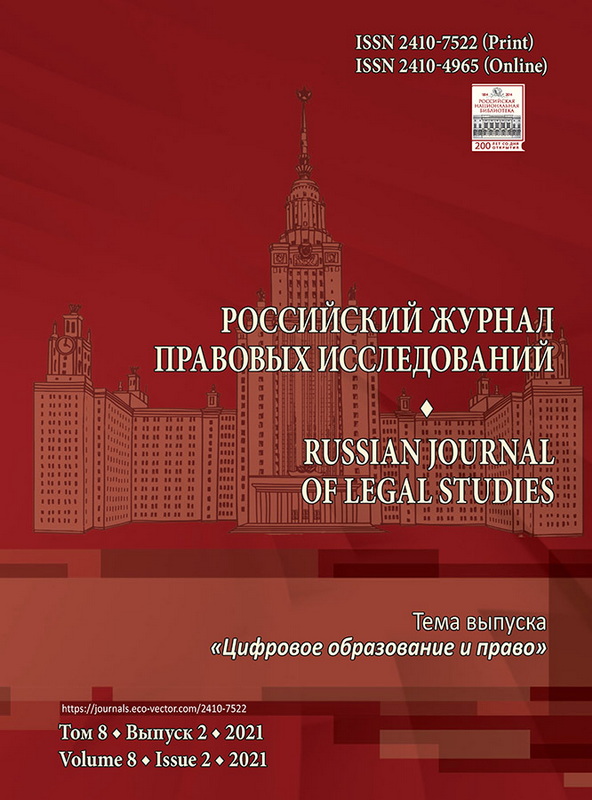Проблемы законодательной регламентации уголовной ответственности за преступления в сфере цифровых финансов
- Авторы: Печегин Д.А.1
-
Учреждения:
- Институт законодательства и сравнительного правоведения при Правительстве Российской Федерации
- Выпуск: Том 8, № 2 (2021)
- Страницы: 53-60
- Раздел: Уголовное право и процесс
- Статья получена: 19.04.2021
- Статья одобрена: 19.04.2021
- Статья опубликована: 12.08.2021
- URL: https://journals.eco-vector.com/2410-7522/article/view/65200
- DOI: https://doi.org/10.17816/RJLS65200
- ID: 65200
Цитировать
Аннотация
Цифровизация сферы финансов в развитых правопорядках, использование технологии блокчейна, внедрение цифровых форм участия в гражданском обороте и введение возможности расчета в цифровых валютах призваны способствовать повышению эффективности экономики и, в конечном итоге, улучшению качества жизни граждан. Однако технологическая прогрессивность и позитивные ожидания от внедрения цифровых технологий в сферу общественных отношений не могут служить гарантией защиты ценностей, закрепленных в Основных законах тех или иных государств. С учетом того, что уровень преступности в сфере экономической деятельности является одним из показателей состояния экономической безопасности, особое внимание необходимо уделить анализу эволюции и прогнозированию развития средств уголовно-правовой охраны валютно-денежной системы, претерпевающей в настоящее время процесс цифровой трансформации. Это связано с тем, что цифровые финансовые технологии несут в себе, помимо прочего, определенные риски для валютно-денежной системы, обусловленные объективными факторами.
Во-первых, от качества функционирования сферы валютно-денежного обращения и эффективности валютных ограничений зависит многое, например макроэкономические показатели стабильности экономической системы, курс национальной валюты, достижение необходимого для стабильного развития уровня сальдо платежного баланса, положение страны на международной арене и проч.
Во-вторых, в условиях усиления структурных дисбалансов в мировой экономике и мировой финансовой системе, роста частной и суверенной задолженности, увеличения разрыва между стоимостной оценкой реальных активов и производных ценных бумаг, резкого снижения роли традиционных факторов обеспечения экономического роста, связанного с научно-технологическими изменениями, именно сфера валютного регулирования и валютного контроля становится одним из стабилизирующих инструментов в системе государственных мер поддержки экономики.
Операции, опосредуемые новыми технологиями, признаны высокорисковыми по всему миру в связи с нестабильностью своего существования. Учет данных, а равно иных рисков внедрения цифровых технологий поэтому требует анализа проблем законодательной регламентации уголовной ответственности за преступления в сфере цифровых финансов.
Ключевые слова
Полный текст
Об авторах
Денис Андреевич Печегин
Институт законодательства и сравнительного правоведения при Правительстве Российской Федерации
Автор, ответственный за переписку.
Email: crim5@izak.ru
ORCID iD: 0000-0001-6499-9966
SPIN-код: 1020-5326
Scopus Author ID: 57204679118
ResearcherId: C-1067-2017
кандидат юридических наук, старший научный сотрудник
Россия, МоскваСписок литературы
- Сидоренко Э.Л. Криминологические риски оборота криптовалюты // Экономика. Налоги. Право. 2017. Т. 10. № 6. С. 147–154.
- Хабриева Т.Я., Черногор Н.Н. Право в условиях цифровой реальности // Журнал российского права. № 1. 2018. С. 85–102.
- Поветкина Н.А., Леднева Ю.В. «Финтех» и «регтех»: границы правового регулирования // Право. Журнал Высшей школы экономики. № 2. 2018. С. 46–67.
- Stepanov O., Pechegin D. Legal view on the introduction of new technologies // Russian Law Journal. 2018. Vol. 6. № 3. P. 149–171.
- Кудратов М., Печегин Д.А. Перемещение активов и незаконный вывод капиталов: актуальные проблемы противодействия // Журнал российского права. 2020. № 1. С. 101–111.
- Кучеров И.И. Слагаемые финансовой безопасности и ее правовое обеспечение // Журнал российского права. 2017. № 6. С. 69–79.
- Bech M., Garratt R. Central bank cryptocurrencies // BIS Quarterly Review. 2017. September. P. 55–70.
- Саженов А.В. Криптовалюты: дематериализация категории вещей в гражданском праве // Закон. 2018. № 9. С. 106–121.
- Отнюкова Г.Д. Правовое регулирование услуг // Юрист. 2014. № 1. С. 37–42.
- Кучеров И.И. Криптовалюта (идеи правовой идентификации и легитимации альтернативных платежных средств): монография. М., 2018. 204 с.
- Немова М.И. Криптовалюта как предмет имущественных преступлений // Закон. 2020. № 8. С. 145–154.
- Печегин Д.А. Квалификация преступлений, связанных с использованием современных электронных сущностей: опыт Германии // Российский журнал правовых исследований. 2018. № 4. С. 120–124.
- Синицын С.А. Российское и зарубежное гражданское право в условиях роботизации и цифровизации. Опыт междисциплинарного и отраслевого исследования: монография / Институт законодательства и сравнительного правоведения при Правительстве Российской Федерации. М.: Инфотропик Медиа, 2020. 212 с.
- Егорова М.А., Ефимова Л.Г. Понятие криптовалют в контексте совершенствования российского законодательства // Lex russica. 2019. № 7. С. 130–140.
- Лунц Л.А. Деньги и денежные обязательства. М., 1998. 131 с.
- Крылов О.М. Денежный суррогат как правовая категория // Административное и муниципальное право. 2019. № 6. С. 41–49.
- Кучина Я.О. Оборот криптовалюты как объект преступления и доктринальные ошибки его восприятия // Актуальные проблемы российского права. 2020. № 4. С. 118–127.
- Яни П.С. Поддельная ценная бумага как предмет фальшивомонетничества // Законность. 2016. № 8. С. 25–29.
- Волженкин Б.В. Экономические преступления. СПб., 1999. 312 с.
- Ясинов О.Ю. Уголовная ответственность за изготовление или сбыт поддельных денег или ценных бумаг: фальшивомонетничество: автореф. дис. ... канд. юрид. наук. М., 2006. 21 с.
- Петрянин А.В. Ответственность за изготовление или сбыт поддельных денег или ценных бумаг: дис. ... канд. юрид. наук. Н. Новгород, 2003. 221 с.
Дополнительные файлы









